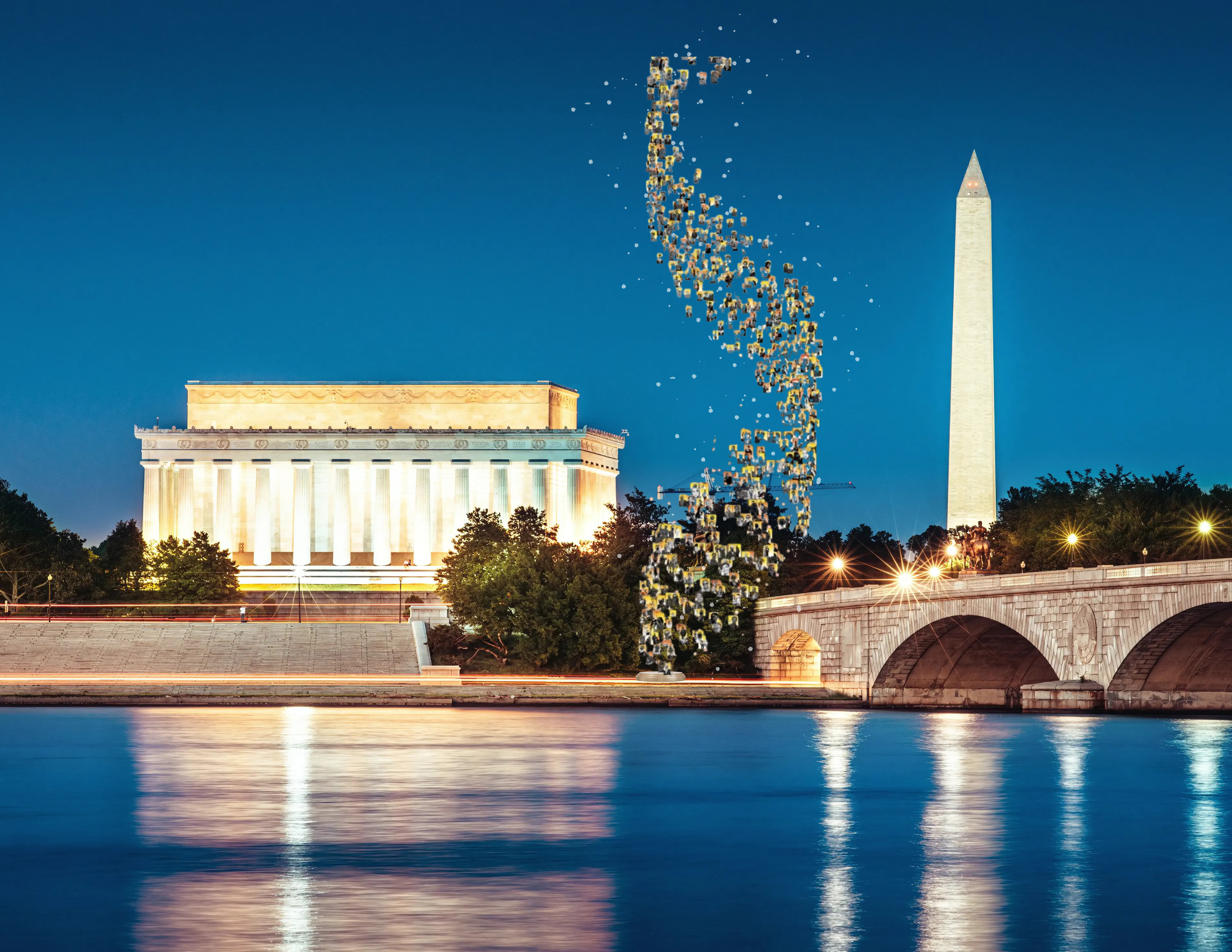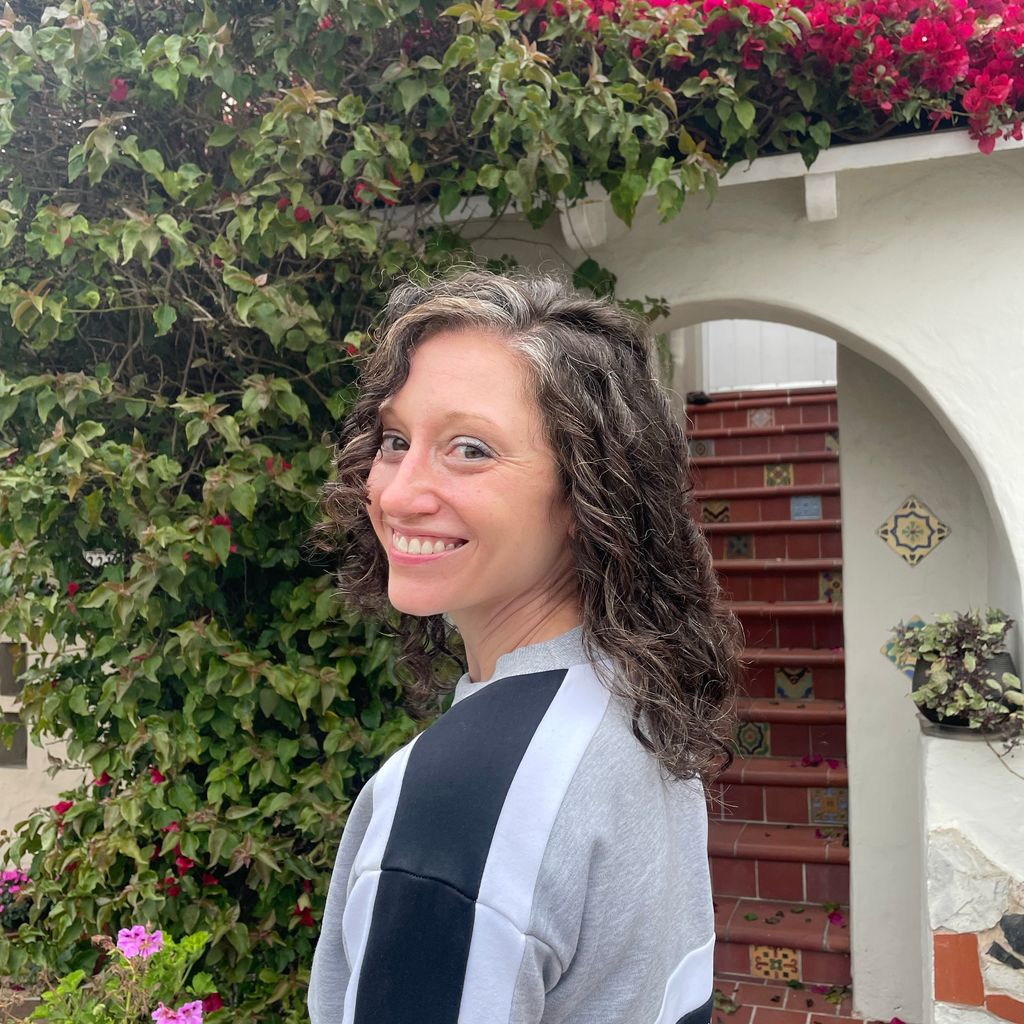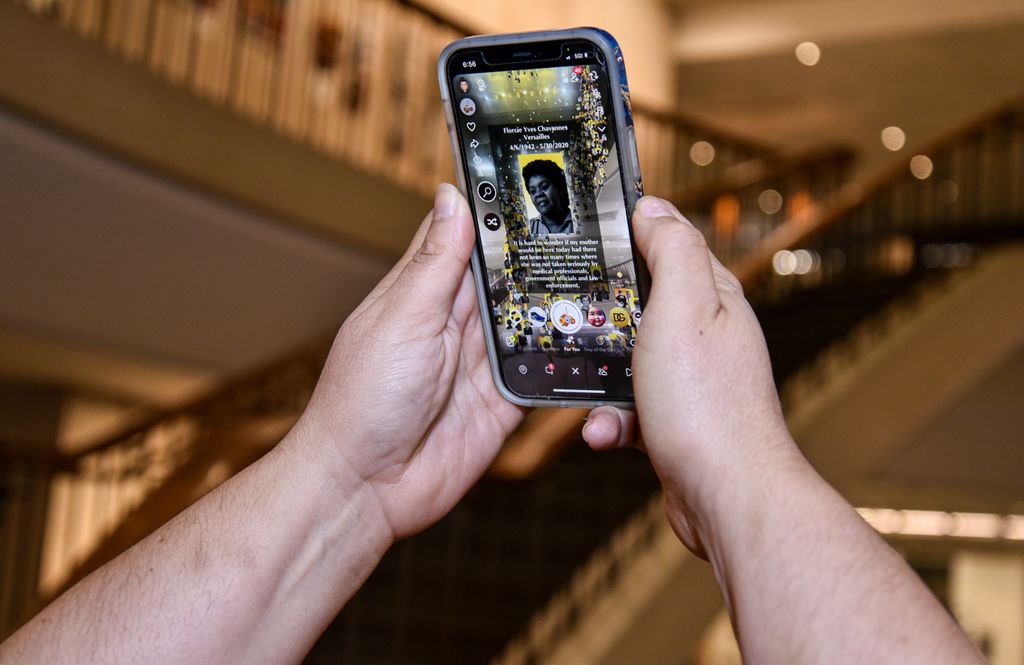“Remember Every One”: Memorializing the More Than 1 Million Lives Lost to COVID-19 in the US.

A digital rendering of the National COVID Memorial as imagined by Marked By COVID. Image courtesy of Christine Keeves.
‘Remember Every One’: Memorializing the More Than 1 Million Lives Lost to COVID-19 in the US
Christine Keeves (SPH’08), co-founder of the nonprofit Marked By COVID, discusses the organization’s efforts to establish both a permanent augmented reality COVID Memorial in Washington, DC and a national COVID Memorial Day in honor of those who lost their lives during the pandemic.
Every first Monday of March for the past 4 years, Christine Keeves (SPH‘08) and her partner Kristin Urquiza have gathered thousands of people from across the country for a virtual vigil honoring loved ones they have lost to COVID-19.

Marked By COVID, the grassroots nonprofit Keeves and Urquiza founded in 2020 to “unite survivors in the pursuit of a just response to the pandemic,” hosts the annual vigil. The event marks the date that the organization is lobbying to have officially recognized as Covid Memorial Day, a national holiday dedicated to remembering COVID victims, supporting survivors, and recognizing healthcare workers.
For many mourners, March brings a flood of memories of how the pandemic upended their lives, says Keeves. “They are forced to revisit the cycle, ‘This is when my loved one got sick. This is when my loved one went on the ventilator. This is when my loved one passed away.’ All those dates are forever written in their minds.”
Keeves, Urquiza, and a small team of volunteers—Marked By COVID is a nearly entirely volunteer-led effort—have organized hundreds of meetings and coordinated tens of thousands of letters to influence Congressional and state leaders to act on what they have identified as urgent policy needs in the wake of the pandemic, what they term their “Five R” plan: Response, Recovery, Restitution, Resiliency, and Recognition. But recently, Keeves says, it has been more difficult to generate support for the full spectrum of interventions Marked By COVID hoped to implement.
“A lot of folks have moved on from COVID,” says Keeves. While available evidence suggests transmission is low compared to years past, experts caution that the virus can still lead to disabling complications and death. An estimated nearly 50,000 Americans died of COVID in 2024.
Today, Marked By COVID concentrates its efforts on securing remembrance, accountability, and an equitable recovery. Members of the Marked By COVID community have expressed desire for both a COVID Memorial Day and a permanent mass memorial, she says. “But not only did they want a memorial, they wanted a memorial that would include each of their own loved ones’ names and photos, which for more than a million people is quite a [challenge], both in terms of collecting all that information and also figuring out how to share it.”

Drawing inspiration from the AIDS Quilt and the Vietnam Veterans Memorial, Keeves and the team at Marked By COVID came together to imagine a one-of-a-kind digital and physical remembrance project, the National COVID Memorial, that harnesses augmented reality technology to feature the names, photos, and personal stories of the more than 1.2 million Americans who lost their lives to COVID-19. They propose to erect a permanent version of the memorial in Washington, DC, but have already begun holding temporary installations in cities across the country. Most recently, the exhibition travelled to Harvard University Medical School’s Countway Library through a partnership with Andrew Stokes, associate professor of global health at BUSPH, whom Keeves became acquainted with after Stokes and his team published research in February 2024 showing that federal statistics failed to accurately account for thousands of COVID-19 deaths.
Keeves estimates that more than 250 cities and over a dozen states now mark COVID Memorial Day. Marked By COVID also has legislation pending in both the House and the Senate, championed in part by Massachusetts senator Elizabeth Warren, that supports the annual observance of a COVID-19 Remembrance Day.
Public health communications and advocacy have been Keeves’ bread and butter since her days at SPH when she served as a teaching assistant for the Strategies in Public Health Advocacy course. Since graduating with her MPH in 2008, Keeves has crafted campaigns large and small for institutions such as Health Care for All, the National Center for Lesbian Rights, the Natural Resources Defense Council, and the San Francisco LGBT Center. From her home office in San Francisco, she spoke with SPH about her ongoing work for Marked By COVID.
Q&A
With Christine Keeves (SPH‘08)
How did you first become involved at Marked By COVID?
I became involved with Marked By COVID when my partner’s dad got sick and then died from COVID in June 2020. I was coming from [a] public health and advocacy background and my partner has a background in campaigns, advocacy, and social justice. If you remember back to 2020, how scared everyone was before vaccines, how much misinformation was making the rounds, how much folks that were struggling needed a voice[… ]Then, we had this personal, difficult experience [of losing her partner’s dad] and we very quickly realized, if we didn’t try to use our skills to help other people, who would speak up? So, we launched Marked By COVID. We were planning her dad’s funeral [in Arizona] and our first press conference at the same time.
Arizona at that time was a hotspot for COVID, and because people were focused on Arizona, the story went national really fast. We picked up a lot of steam and because of that we were able to connect with a lot of other people who had also lost loved ones to COVID who were upset, angry, scared, or just wanted to protect other people from what they had experienced. We built a network of folks who were available to talk to [the] media and share their stories. Folks came from all different backgrounds and all different experiences but were willing to put themselves and their privacy on the line to help spread the word.
Can you speak about the organization’s mission today?
We realized pretty quickly that despite how horrible COVID was that it could be an opportunity to show people how we could build our public health and economic systems to better support folks. Because during the pandemic, especially the first year or two, some cities and states were passing really powerful policies that [addressed] longstanding disparities. Childhood poverty [for example] went down tremendously over the course of the pandemic.
We hoped to be able to build off of that [beginning with] folks who were not able to access healthcare. Since that [problem] was so visible in communities at that point, we thought we would be able to use it to push for better [quality] healthcare and healthcare for all. We called for a nationally coordinated data-informed response to COVID during Trump’s first presidency. [But] our country’s attention span is pretty short these days. There is a new disaster every other week, and we care a lot when it happens, but it is hard to sustain attention which makes it hard to sustain support. We wanted to make sure that we were focused on the recovery long enough to really help people get back on their feet.
Do you have any specific actions planned around the upcoming fifth anniversary of the start of the pandemic?
This year on COVID Memorial Day, we officially announced the launch of what we are calling our “Remember Every One” campaign, which is our official national effort to collect all of the names [of the deceased]. One advantage of collecting all these names and building this network is that we are also collecting the contact information of [survivors] who have been highly impacted by COVID, which means that we could then put more supports in place for those folks. For example, we are working on something called HOPE trust accounts in California. Under the program, kids who have lost a parent to COVID will have $4,500 set aside for them to access once they turn age 18. By collecting the names of adults who died of COVID, we will be able to help identify these kids and give them a small portion of the help that they deserve after having this life-altering experience.
What kinds of challenges have you encountered in pursuing this work? How do you sustain momentum?
As we have seen presidents on both sides of the aisle struggle with their COVID response and struggle to get this huge, diverse country all on the same page, it’s proven to be difficult to bring big change. As a result, we still have these big, lofty goals that you see in the 5 R’s, but our strategy has shifted a bit. We are really focused on [building] the National COVID Memorial and establishing a COVID Memorial Day, both because these are what community members, folks who have lost loved ones to COVID, have communicated would be healing and because it draws this line in the sand that says: This happened, it was a big deal, we cannot forget about it, and we need to learn about it.

Comments & Discussion
Boston University moderates comments to facilitate an informed, substantive, civil conversation. Abusive, profane, self-promotional, misleading, incoherent or off-topic comments will be rejected. Moderators are staffed during regular business hours (EST) and can only accept comments written in English. Statistics or facts must include a citation or a link to the citation.